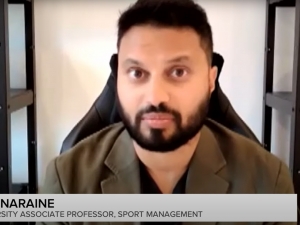When one thinks of research activities, being cited in newspapers and magazines or on websites, radio and television does not immediately come to mind.
But interactions with news media – being quoted in news or feature reports, writing commentaries or having research projects profiled in the press – have increasingly become part of researchers’ roles and responsibilities, say researchers and university officials.
“The general public is very often interested in knowing about what we do,” says Community Health Sciences professor Anthony Bogaert, who has been featured in a wide array of national and international media primarily for his pioneering work on asexuality.
This is in large part because society – like the students in the classroom – has a thirst for knowledge, while a key activity of a researcher’s job is to disseminate knowledge, says Vice-President Research Gary Libben.
Media appearances are “in no way different from that core mandate to share knowledge,” says Libben. “It’s in a different venue perhaps with different people, but that’s all the better.
“A democratic society is an informed society. It’s a society that has chosen to think.”
Labour studies professor Kendra Coulter is passionate about this knowledge-sharing activity as she conducts interviews and pens commentaries that focus on her area of expertise, workers’ rights.
“Enriching public discourse by offering thoughtful, factually-based insights is an integral dimension of our responsibilities, especially given the pressing and dire nature of so many of today’s challenges,” she says.
But Bogaert says it’s a two-way street, one that also benefits the researcher.
“It is a good way to promote your research,” he says. “But this is not just to the general public; the broader academic community often learns about our research from media stories.”
Both Bogaert and Coulter also say researchers develop and hone their communications skills as they go through the exercise of explaining complex material in relevant, engaging terms and answer the key questions of why and how their research matters.
Publicizing this research leads, in turn, to building Brock University’s reputation.
“Brock has such high quality faculty members,” says Coulter. “The more we amplify our voices through the media, the more people will understand that Brock is an outstanding academic community.”
And, reputation enhancement can translate into more resources for research. “More and more granting agencies have an expectation that dissemination include communication with the general public, including through media outlets,” notes Bogaert.
To encourage researchers’ involvement with the media, and make it easier for media to connect with researchers, Brock’s Office of Communications & Public Affairs is working with the Office of Research Services and Faculties to create a fresh new BrockU Experts Guide for Media. This web-based resource will be posted on various University websites and shared with local, national and international news media organizations.
“Brock has a diverse roster of faculty experts who can comment on, well you name it,” says Jeffrey Sinibaldi, manager of media relations at Brock. “Creating an up-to-date resource like this will enable our office to better proactively pitch our experts to media to comment on the timely and burning issues of the day.”
To become part of this media initiative, faculty members can fill in the yellow-coloured submission forms that will be landing in mailboxes this week.
If anyone has questions, or wants to send submissions in electronically, please contact Jeffrey Sinibaldi (x4687; jsinibaldi@brocku.ca) or Cathy Majtenyi, media relations specialist, Research Services (x5789; cmajtenyi@brocku.ca).
Vice-President Research Gary Libben says communications initiatives such as this reflect the changing research landscape.
“We’re in the midst of an extraordinary revolution in terms of scientific communication,” he says. “It used to be the case that scientific communication meant communication in really, really small spaces among experts. That’s just not the way it is anymore.
“We have the ability to spread knowledge everywhere; we just didn’t have that ability before. But now we have that ability through media, through blogs and other vehicles. It’s incumbent upon us to use these extraordinary opportunities.”













I am often called to speak on TV or in the newspapers in regards to Aboriginal issues.